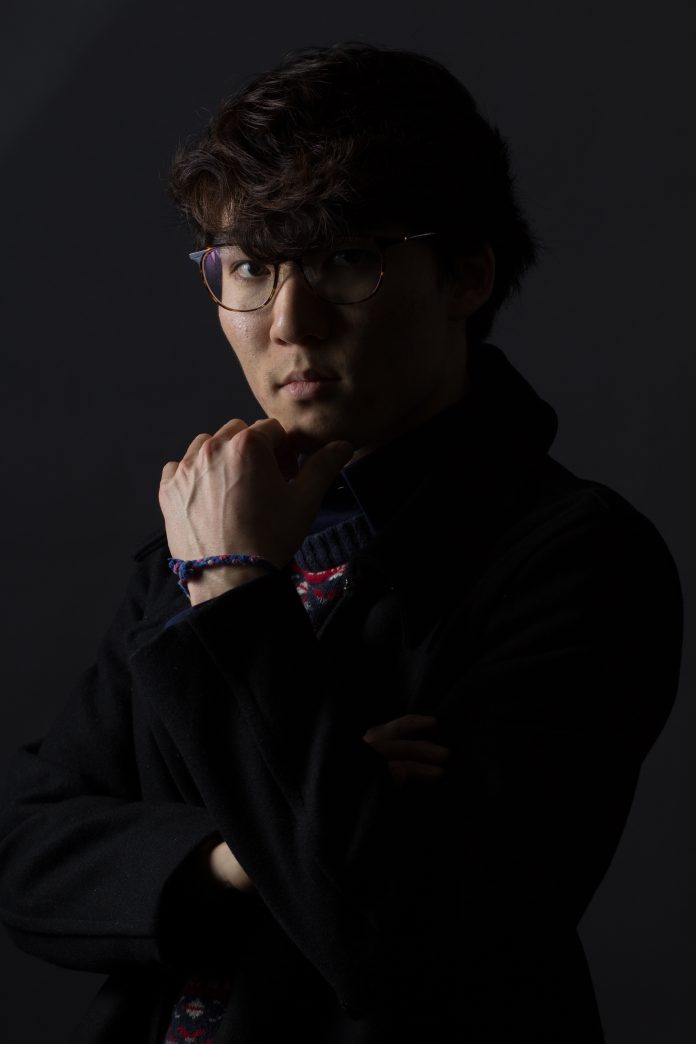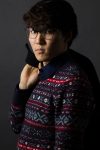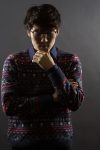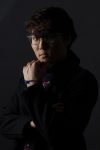
Byron: We’re here with Keisuke Ohtani. Tell me about your outfit today. I noticed the nice sweater, the collared shirt. Tell me about it.
Keisuke: I’m trying to get a similar fashion to Newt Scamander from “Fantastic Beasts”-the British guy, even including hair. I like kind of formal fashion, and the other people on campus wear sweatshirts. I think, going to school, I need to wear formal fashion because it’s like the place you need to focus. It’s like a business. In a New York, business, town, you don’t wear sweatshirts to go to work. To me, it’s the same thing. The school is work to me. I am a student as a profession. The people work in a business and they cannot be rude. So I try to keep my fashion neat.
Byron: So where’d you get the sweater?
Keisuke: I think I got it at Old Navy, wasn’t very expensive. It seems kind of Christmas colored. Red, navy, but this is my favorite sweatshirt. I wear it all the time. I really like wearing jeans. I think I can go with a formal or casual. It’s very versatile. I pay attention to how slim it is. I even want that to be slimmer ‘cause I like very slim fit. It kind of shows shape.
Byron: So when you wake up in the morning, how do you figure out what you’re going to wear?
Keisuke: Every morning I check weather. When I lived in my room by myself I always say “Hey Siri, what’s the weather?” Depending on how I feel, who I’m meeting with. If there’s an important meeting, I may wear the shirt with a collar. If it’s super warm, I just wear a t-shirt. My favorite t-shirt is of Darth Vader from the Japanese company called Uni Qlo.
Byron: I noticed that when you wear your crewnecks, you wear these collared shirts under which I think is a really cool look. So did you also get that from the guy from “Fantastic Beasts and Where to Find Them” or was that something that you came up on your own?
Keisuke: So again, it kind of comes from my fundamental idea that I should wear formal, nicer wear. I think it comes from my high school uniform. I went to high school in Japan. In Tokyo, we were all required to wear shirt, jacket, and pants, but we wear something like a suit. Since I was on the baseball team, I was required to wear a tie every single day all the way up. Wearing fashion like that makes me feel legit. In my room, I can just chill and be lazy. But when I go out, I have to be formal, be a businessman.
Byron: Going back to your roots in Tokyo, were there any kind of other fashion trends that you followed or influenced you outside of school? Were there any celebrities that influenced your style back in Tokyo?
Keisuke: I don’t think so. I was more influenced by popular fashion in our generation. So I think I’m wearing fashion that is preferred in our generation instead of following newest fashion in Tokyo. If you go to Japan, especially in Tokyo, you see college students wearing fashion like me. Like a peacoat or a longer coat, and the boots. Maybe jeans or like skinnier pants with sweater. That’s very typical fashion in Japan. I think I was influenced by that fashion style.
Byron: Coming from a place like Tokyo to DePauw and comparing the cultural norms there, how has it affected you being on campus here? Has it been a culture shock? It it just something you’ve adapted to?
Keisuke: The culture shock is the segregation on this campus. Between local people and the international students, or African American students. It’s not very visible. I’ve never really been offended by what people say, but I feel the distance from the majority people, which I didn’t really feel when I was in Iowa because I wasn’t really aware of race. The people were more open to ask.
They weren’t educated about race so much. But because of that, they asked me questions like “what culture do you have? What do you eat there?” One guy even asked me a question. “I don’t know where Japan is, that’s the capital city of China, right?” Like, oh man. But it’s a good thing. I see that he was uneducated in that way, but he learned something by asking questions. I think here, people are more afraid of asking questions. Keep distance and they never fill up that distance.
Byron: How do you think that you can bridge that gap?
Keisuke: I want [local students] to ask questions, it can be dumb questions, like is China the capital of Japan? But by asking questions, no longer have a distance. We are one step closer. Those smaller steps. By coming to events. International bazar. Doing photography is a good thing too. Because I meet those people that I’ve never talked to before. Once in a while, I have to take pictures of students. One time, it was Rector Scholars. I took pictures in East College. All the people I met there was my first time talking to. Some of them I’ve never seen. Hopefully, what I’m doing- I’m starting a photography club- hopefully, it’s a gonna be a bridge between local students, international students, and minority groups.





